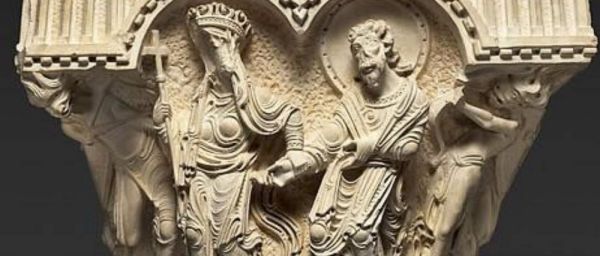Undeviating Happiness
(Mt 5:17-19)
In the early congregations, some believers believed that First Testament regulations should no longer be considered, since we are saved by Faith and not by works of Law.
Others accepted Jesus as the Messiah, but resented the excess of freedom with which some church brothers experienced his Presence in Spirit.
Still tied to an ideal ethnic background, they felt that the ancient observance was obligatory.
Precisely under the guise of "life in the Spirit", there was no shortage of believers enraptured by an excess of fantasies (personal or group), believed to be "inspired".
Some with an easy-going mentality, prone to compromise with power, denied the Hebrew Scriptures and considered themselves disengaged from history: they no longer looked at the story of Jesus.
Mt sought a balance between compromising emancipation and closure in observances, believing that communal experience could achieve harmony between different sensibilities.
He writes his Gospel precisely to support converts to the Faith in Christ in the communities of Galilee and Syria, accused by their Judaizing brethren of being unfaithful to the Torah.
The evangelist makes it clear that Jesus himself had been accused of serious transgressions of the Law of Moses.
The Torah arrow was shot in the right direction, but only in the Spirit of the Beatitudes can a living assembly gain momentum to reach the ideal goal: Communion.
Matthew is at pains to emphasise that the ancient Scriptures, the historical story of Jesus, and life in the Spirit are to be valued as inseparable aspects of a single plan of salvation.
Lived in synergy, they lead to the fruitful coexistence and conviviality of differences.
The God of the patriarchs makes himself present in the loving relationship of the communities, through the Faith in Christ that expands his own life in their hearts.
The Living One transmits the Spirit that spurs all creativity, overcomes discouraging closures; he opens, and invites.
In short, in us Jesus of Nazareth becomes the living Body - and the taste for doing manifests Him (starting from the soul) in Person and full Faithfulness.
Reaching out to our brothers and sisters and going to God thus becomes agile, spontaneous, rich and very personal for everyone: the Strength comes from within, not from common ideas, legacies, seductions, mannerisms, or external urges.
To internalise and live the message:
Has the law in stone remained a rigid thing in you, or do you feel a new Covenant impulse?
Do you perceive within you an actualised and irresistible desire for good, which rediscovers everything of the Scriptures, and energises the Word in the various tastes of doing?
Demolish or completely Doing
Confronted with the precepts of the Law, different attitudes manifest themselves.
On the one hand, there are those who show attachment to the material sense of what is laid down; on the other, omission or disregard for the rules.
Jesus' teaching was so new and radical that it gave the impression of disregard and rejection of the Law. But in fact, rather than disagreeing with it, He was attentive to the spirit and deep meaning of the biblical-Judaic directives.
He did not intend to 'demolish' (v.17) the Torah, but he certainly avoided allowing himself to be minimised in the casuistry of morality.
Such an ethical obsession - still alive in the primitive fraternities - fragmented and crumbled the meaning of the basic choices, and made them all external, without focus.
This produced a de facto legalistic scleroticisation, which easily tended to equate the codes... with God.
But for the believer, his 'obligation' is at once affair, spirit of the Word, and Person: global following in those same incomparable appointments.
The believers in the communities of Galilee and Syria suffered criticism from the old-fashioned Jews.
These observant ones accused co-religionists converted to the new personal, creative Faith of being transgressors and contrary to the depth of the common Tradition.
Thus some emphasised salvation by faith alone in Christ and not by works of law. Others did not accept the Freedom that was growing in those who were beginning to believe in Jesus the Messiah.
New, more radical currents already wished to disregard His history and His Person, to get rid of them and take refuge in a generic "avant-garde" or "freedom of spirit" - without backbone, nor backbone or conjuncture.
Mt helps to understand the disagreement: the direction of the Arrow shot from the Judaic Scriptures is the right one, but it does not have a concordant and totally clear cue, nor the strength to reach the Target.
The evangelist harmonises the tensions, emphasising that authentic observance is not formal faithfulness [obedience of the "letter"].
The spirit of fundamental fulfilment does not allow one to put the total Christ and his travails in parentheses, perhaps then remaining neutral or indifferent dreamers.
Without reductions in the power of election, nor "putting down" (v. 17) the ways of being, ancient and identified or particular - He is present in the facets of the most diverse currents of thought.
New Words, ancient Words, and Spirit renewing the face of the earth, are part of one Design.
Only in the total fascination of the Risen One does our harvest come to complete life - the full objective of the Law - becoming forever.
To internalise and live the message:
How do you evaluate Pentateuch, Psalms and Prophets?
How do you deal with situations in harmony with the Voice of the Lord and in His Spirit?












